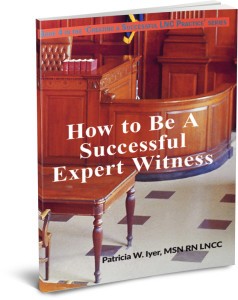Expert Witness Advice: How Do I Get Out of a Case? Part 1
 “The attorney told me I would never have to testify. Now I found out it is going to trial! I don’t want to go.” Have you ever heard this complaint from an expert? Ever made that statement yourself as an expert?
“The attorney told me I would never have to testify. Now I found out it is going to trial! I don’t want to go.” Have you ever heard this complaint from an expert? Ever made that statement yourself as an expert?
Responsibilities of an Expert Witness
An expert enters into an agreement with an attorney when he or she agrees to review the case. The understanding is that if the expert has no conflict of interest and finds he or she can support the attorney’s side of the case, the expert agrees to be part of the case, including testifying if the case goes that far.
Conflict of Interest Check
If you are an expert or work in a legal nurse consulting practice or expert witness referral service, you should do a conflict of interest check as soon as you are approached about a case. This means your record keeping system has to be up to date to show which cases you have been involved in. The expert cannot accept a case that he or she has already reviewed for the opposing counsel. The expert also needs to be sure the defendant is not a current employer, or another facility that is part of the same chain as the employer’s facility.
For example, a healthcare conglomerate may own several hospitals in a state. The expert should not agree to serve as an expert involving another hospital within the same corporate structure.
At times, an expert finds out partway through reviewing a case that he or she knows one of the defendants. If you are the expert, the best way to handle this is to let the attorney know of the potential conflict and determine if it is a big enough issue to preclude the expert from going further with the case. You might have heard of the defendant but never met him. Or you may have gone to nursing school with the defendant. Each poses different potential outcomes.
Discovery Deadlines
Each case is affected by discovery deadlines. The judge is typically the one who sets the deadlines with attorneys on both sides. The discovery period gives the attorneys the opportunity to seek information from each side, file motions, take depositions and get reports from their experts. (In some states, experts are neither named, deposed, not prepare reports.) Once the discovery deadline has passed it is very difficult for an attorney to substitute one expert for another.
Attorney Behavioral Issues
Regardless of how much an attorney believes a case will settle before trial, attorneys are not gifted with a 100% accurate ability to foresee the future. Factors the attorney could not predict can derail the settlement discussions. While it is tempting to believe an attorney when she says the expert will never have to testify in court, “it ain’t over til it is over and the deal is done.”
How about you don’t like the attorney? You might say, “I don’t want to testify for him. He was not nice to me. He was gruff when we were finalizing the report.” You may feel like this, but this is not a sufficient reason to withdraw from a case. Get over it.
Attorneys are like everyone else who works in a high pressure field. They can be very charming and they can be short tempered. Your job as an expert is to rise above your irritation with the attorney and to be a professional. Do your best to ignore your feelings and remember what is at stake.

Check out Part 2 of this blog to discover the consequences of withdrawing from a case. Get Pat’s book, “How to Be a Successful Expert Witness”, at this link. Get expert witness advice to increase your success.
Pat Iyer MSN RN LNCC was an expert witness for 20 years. She has also heard the statement, “Don’t worry. You won’t have to go to court.”
